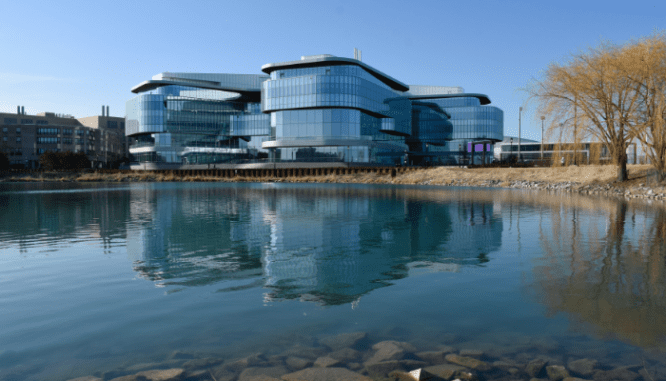Evanston Is the First Municipality in the U.S. to Use Public Funds for Black Reparations — Here’s How it Works
- Published on
- 5 min read
-
 Alesandra Dubin Contributing AuthorClose
Alesandra Dubin Contributing AuthorClose Alesandra Dubin Contributing Author
Alesandra Dubin Contributing AuthorAlesandra Dubin is a lifestyle journalist and content marketing writer based in Los Angeles. Her vertical specialties include real estate; travel; health and wellness; meetings and events; and parenting. Her work has appeared in Business Insider, Good Housekeeping, TODAY, E!, Parents, and countless other outlets. She holds a master's degree in journalism from NYU.
Updated on March 23, 2021:
On March 22, the Evanston City Council voted to approve a reparations plan for Black residents that will be the first of its kind in the country, committing $10 million in tax funds generated from recreational cannabis sales to the program.
The 8-1 vote approved the plan to distribute $400,000 to Black residents with ties to the city between 1919 and 1969. Black residents affected by discrimination in the community after 1969 will also be eligible for the money, which will be allocated in chunks up to $25,000 beginning in mid-summer at the soonest. Recipients can use their funds to help buy or improve a home, or to pay a mortgage.
Cicely L. Fleming is the Black alderwoman who cast the sole dissenting vote. While she does support reparations, she expressed her view that this is the wrong approach because it doesn’t give individuals enough autonomy.
“Let me be clear,” she said in the meeting, according to a transcript of the statement Fleming’s office provided to HomeLight. “I am 100% in support of reparations. I come from three legacy Black families in Evanston who have suffered enough. I am one of countless such families across the country. Real reparations are long overdue. But what is before us tonight is a housing plan dressed up as reparations.”
She told HomeLight, “I voted no because the plan put forward was a housing plan, not a reparations plan. A real reparations plan would have given autonomy, in the form of cash payments, to those who have been harmed by systemic racism. A real reparations program would have trusted the Black community. This program is an insult to the intent of reparations. It is power dictating to the people rather than the other way around.”
And it troubles her that Evanston’s plan may serve as a template for other municipalities around the country to follow suit. Instead, other places “can learn what not to do” from Evanston, she told HomeLight. “They can create reparations programs that give real agency and autonomy to Black residents who have endured generations of racist government policies that were designed to deny them fair housing, fair wages, decent healthcare, and a good education.”
Some Evanston residents agree with the alderwoman about the plan, which doesn’t benefit Black community members who don’t own a home or plan to buy one. One such longtime city resident, Rose Cannon, voiced this sentiment during a public comment session. “We want cash payments,” she said.
Original story continues below…
The systemic racism in real estate is well-documented — and its effects on people of color are real. This is especially true for Black people, who own a disproportionately low share of the homes in the U.S: For instance, consider that there’s a gap of nearly 30% between white and Black homeownership in America.
But what if there was something that could actually help reverse decades of damage? And what if that thing was … cannabis?
Those are questions that Evanston, Illinois, wants to answer with a revolutionary new program designed to use tax dollars generated from cannabis sales to help increase Black homeownership in the suburb. To be clear: Evanston is paying reparations, and pot is helping make it happen.
Here’s an introduction to Evanston’s ground-breaking reparations plan, and how it’s been working so far in the city where white homeownership is disproportionately high and the Black population has been diminishing.

Evanston’s diversity problem
Diversity in Evanston has long been recognized as a problem. The college town of about 74,000 residents, located 12 miles north of Chicago, is mostly white — and in the highest-home-value neighborhoods, it’s almost entirely white.
And the gap has only been growing in recent years: From 2000 to 2017, the Black population in Evanston decreased from 22.5% to 16.9% of the total population.
Locally, politicians and activists in Evanston had already recognized the issue and had been working on ideas for how to solve it.
“Our gaps were widening,” city alderman Robin Rue Simmons explained in an interview with The Guardian.
“I thought we were being delusional to continue in the same vein and believe we would bridge the gap.”
Bigger-picture housing inequality and the case for reparations
Now let’s step back and widen the frame for a moment. This is a nationwide problem — not limited just to Evanston. And the case for reparations has been gaining steam in recent years as part of scientific research, as well as in the larger cultural conversation.
In 2007, two Oregon State University professors published a study, “Housing Discrimination as a Basis for Black Reparations.” In it, they argued that historic housing and lending discrimination makes for a sound basis to consider Black reparations.
“Because of a number of policies and practices, particularly those of the federal government, many African Americans were unable to take advantage of the opportunity to buy a home on the favorable terms that were available to many white Americans,” the study noted.
Even when Black Americans could buy homes, these homes were less valuable and appreciated at lower rates, largely due to the same discriminatory policies and practices. All of this resulted in serious structural inequality in housing and the large wealth gap between Black and white households, and it in turn only further reinforced other aspects of racial inequality like access to schools.
Importantly, the study noted, the housing market won’t correct itself for this problem naturally over time. Therefore, the authors wrote, “Regardless of the specific measures that are taken, the essential point should be clear: Black reparations are called for, not just because of slavery but because of much more recent and very systematic injustices. Housing discrimination in the twentieth century forms an important part — though still only a part — of the case for Black reparations.”

Evanston’s ground-breaking solution
Back to local politics in Evanston. In June 2019, the city council passed a resolution, 58-R-19, “affirming the city’s commitment to end structural racism and achieve racial equity.”
Next, a city equity and empowerment commission held community meetings to talk about reparations and gather input from the public. The commission summarized its findings from these meetings in a report for the city council, which created a subcommittee to start the planning.
By November of that year, the measure came to a vote at a meeting of the Evanston city council. While these types of meetings are often ho-hum affairs covering dry policy topics, this one came with a sense of history and pioneerism — and the measure passed nearly unanimously.
The vote was eight to one in favor of “A Resolution Establishing a City of Evanston Funding Source Devoted to Local Reparations.” In so voting, Evanston became the first municipality in the country to pledge public money to reparations for Black residents.
The language specified how it would happen: “The Chief Financial Officer is hereby authorized to divert all adult use cannabis funds received by the Illinois Department of Revenue for sales of adult use cannabis to a separate fund in a City account for local reparations.”
As part of the city’s 2020 budget, Evanston created a reparations fund that would draw tax revenue from adult recreational cannabis sales — up to $10 million. Members of the public are also invited to make a donation into the fund.
In February 2020, the reparations subcommittee met to discuss the history and possible solutions to housing and redlining in Evanston. Minutes show the meeting presented stark data on the state of housing in Black America.
For instance, Blacks have a 31.14% denial rate for mortgages; this population represents 14.6% of the U.S., but only receives 6% of new mortgages nationwide. In Chicago, of 13,190 Black applications for homeownership, only 5,200 were approved.
By the way, Black access to real estate is not only limited in terms of homeownership, but also in terms of professional access within the industry: According to research by Deloitte, fewer than 6% of active real estate agents and brokers identify as Black, compared with more than 11% of the population.
To address this, HomeLight recently announced a partnership with the National Association of Real Estate Brokers (NAREB) to launch the Black Real Estate Agent Program, an effort geared at making the industry more inclusive while helping Black real estate agents get started — and thrive — in the business.
Rolling out the reparations program
At the February 2020 meeting, Mark Edward Alston, owner of Skyway Realty and Alston & Associates Mortgage Company, and a public policy strategist in the areas of housing and finance, outlined suggestions for needed remedies. Among them, he suggested the reparations fund starts a grant of $10,000 to $15,000 for homeowners and homebuyers in Evanston, particularly in its 5th ward. They should receive down payment assistance in the form of a grant, he said.
Months later, in August 2020, a subcommittee appointed by the city council recommended that the council approve the use of $400,000 from the fund for housing assistance programs meant to benefit 16 households. The money would provide housing assistance for Black residents who were discriminated against by the city, or whose ancestors were discriminated against by the city in the years between 1900 and 1969.
What now?
At a meeting in November, Alderman Ann Rainey explained that the city expects to collect $1 million in the fund within its first year, both through cannabis sales as well as personal donations.
She also said the city plans to develop a committee to review eligibility and determine funding. So these are important steps forward, the city council agrees — but there’s plenty of work to be done.
“Everyone is frustrated,” said Rue Simmons, as cited in Evanston daily news pub The Daily Northwestern. “This program is overdue. It’s not enough. I’m hearing all of that and I am completely agreeing, but I just have to say how proud I am that we are making these steps towards repair.”
Header Image Source: (Matthew Henry / Burst)
